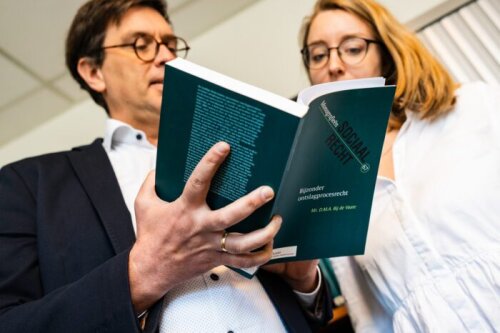Best Divorce & Separation Lawyers in Netherlands
Share your needs with us, get contacted by law firms.
Free. Takes 2 min.
Free Guide to Hiring a Family Lawyer
Or refine your search by selecting a city:
List of the best lawyers in Netherlands
About Divorce & Separation Law in Netherlands
Divorce and separation in the Netherlands are governed by a comprehensive legal framework that emphasizes amicable resolution and child welfare. Under Dutch law, a marriage can be dissolved through a formal divorce procedure, which can be initiated by one or both spouses. The Netherlands also recognizes partnerships that are terminated through registered partnership dissolution, which may follow similar procedures to those of a marriage. Notably, Dutch law encourages mediation and collaborative solutions, promoting a fair division of assets and responsibilities. Child custody, alimony, and division of property are addressed diligently to ensure equitable outcomes.
Why You May Need a Lawyer
Navigating the legal landscape of divorce and separation can be complex and emotionally challenging. Engaging a lawyer can be critical in various situations such as:
- Complex Financial Situations: When spouses have extensive assets, businesses, or debts needing detailed division.
- Child Custody and Support: When there are disputes over child custody arrangements, visitation rights, or support obligations.
- Alimony Disputes: Clarifying or contesting spousal support amounts and conditions.
- Property Disputes: Determining the fair division of jointly owned property or assets.
- Pre/Postnuptial Agreements: Enforcing or contesting agreements made before or during the marriage.
- International Issues: Managing cross-border divorces where international laws or jurisdictions apply.
Local Laws Overview
Several key aspects of Dutch law pertain to divorce and separation procedures, including:
- Grounds for Divorce: The Netherlands follows a no-fault divorce model, meaning there is no need to prove wrongdoing by either party to secure a divorce.
- Mediation Requirement: Courts often encourage or require mediation as a first step to resolve disputes amicably.
- Division of Property: The principle of community property typically applies, whereby assets and debts are split equally unless stated otherwise in prenuptial agreements.
- Child Custody and Support: Focuses on the best interests of the child, with both parents ideally sharing responsibilities equally.
- Alimony: There are clear guidelines for both spousal and child support, considering the needs and means of both parties.
Frequently Asked Questions
What are the requirements for getting a divorce in the Netherlands?
To file for divorce, at least one of the spouses must be a Dutch resident or have Dutch citizenship. The process begins by filing a petition with the court.
How long does the divorce process usually take?
The duration varies but typically ranges from several months to about a year, depending on complexity and whether parties reach a settlement quickly.
Do we have to go to court?
If both parties agree on all terms, they may complete the process with minimal court involvement. Otherwise, unresolved issues mandate court intervention.
What happens with child custody?
Parents are encouraged to develop a parenting plan, with joint custody favored unless circumstances dictate otherwise for the child’s welfare.
Can a prenuptial agreement be contested?
Yes, prenuptial agreements can be contested in court if one party believes its terms are unfair or were consented under duress.
What is mediation, and is it compulsory?
Mediation is a facilitated negotiation process to resolve differences amicably. It is often encouraged and sometimes required before litigation.
How are assets divided in Dutch divorce?
Assets acquired during the marriage are typically split equally unless a prenuptial agreement specifies otherwise, following the community property system.
Will I be entitled to alimony?
Spousal support depends on the economic disparity between spouses and the length of the marriage. Courts assess individual circumstances to determine eligibility.
What if my partner lives abroad?
International divorces might involve additional complexity. Dutch courts can still process the divorce if jurisdictional requirements are met.
How can unmarried couples separate legally?
Unmarried couples with registered partnerships may dissolve them similarly to marriage but often face different legal considerations regarding property and children.
Additional Resources
For more information and support, consider reaching out to the following resources:
- Legal Aid Board (Raad voor Rechtsbijstand): Provides information on legal aid and assistance for those unable to afford private counsel.
- Child Welfare Council (Raad voor de Kinderbescherming): Offers guidance and advocacy for children’s rights during divorce proceedings.
- Mediation Organisations: Groups like the Dutch Association of Family Mediators can help facilitate neutral third-party mediation services.
- Local Municipalities: Offer accessible preliminary guidance on procedures for divorce and separation.
Next Steps
If you require legal assistance in the area of divorce and separation, consider these steps:
- Consult a Lawyer: Begin with a consultation with a family lawyer specializing in Dutch divorce law to discuss your options.
- Gather Relevant Documents: Collect marriage certificates, prenuptial agreements, financial records, and any correspondence relevant to your case.
- Explore Mediation: Investigate mediation options to resolve disputes outside of court amicably.
- Consider Financial Planning: Work with financial advisors to understand the economic impact of divorce and plan accordingly.
- Prepare a Parenting Plan: If children are involved, draft a preliminary parenting plan proposal.
- Stay Informed: Keep updated on any changes in laws or regulations that may affect your case.
Lawzana helps you find the best lawyers and law firms in Netherlands through a curated and pre-screened list of qualified legal professionals. Our platform offers rankings and detailed profiles of attorneys and law firms, allowing you to compare based on practice areas, including Divorce & Separation, experience, and client feedback.
Each profile includes a description of the firm's areas of practice, client reviews, team members and partners, year of establishment, spoken languages, office locations, contact information, social media presence, and any published articles or resources. Most firms on our platform speak English and are experienced in both local and international legal matters.
Get a quote from top-rated law firms in Netherlands — quickly, securely, and without unnecessary hassle.
Disclaimer:
The information provided on this page is for general informational purposes only and does not constitute legal advice. While we strive to ensure the accuracy and relevance of the content, legal information may change over time, and interpretations of the law can vary. You should always consult with a qualified legal professional for advice specific to your situation.
We disclaim all liability for actions taken or not taken based on the content of this page. If you believe any information is incorrect or outdated, please contact us, and we will review and update it where appropriate.
Browse divorce & separation law firms by city in Netherlands
Refine your search by selecting a city.
















